ISKCON’s 30th Communications Conference Held at Radhadesh
By Tattvavit Das | Jun 06, 2024
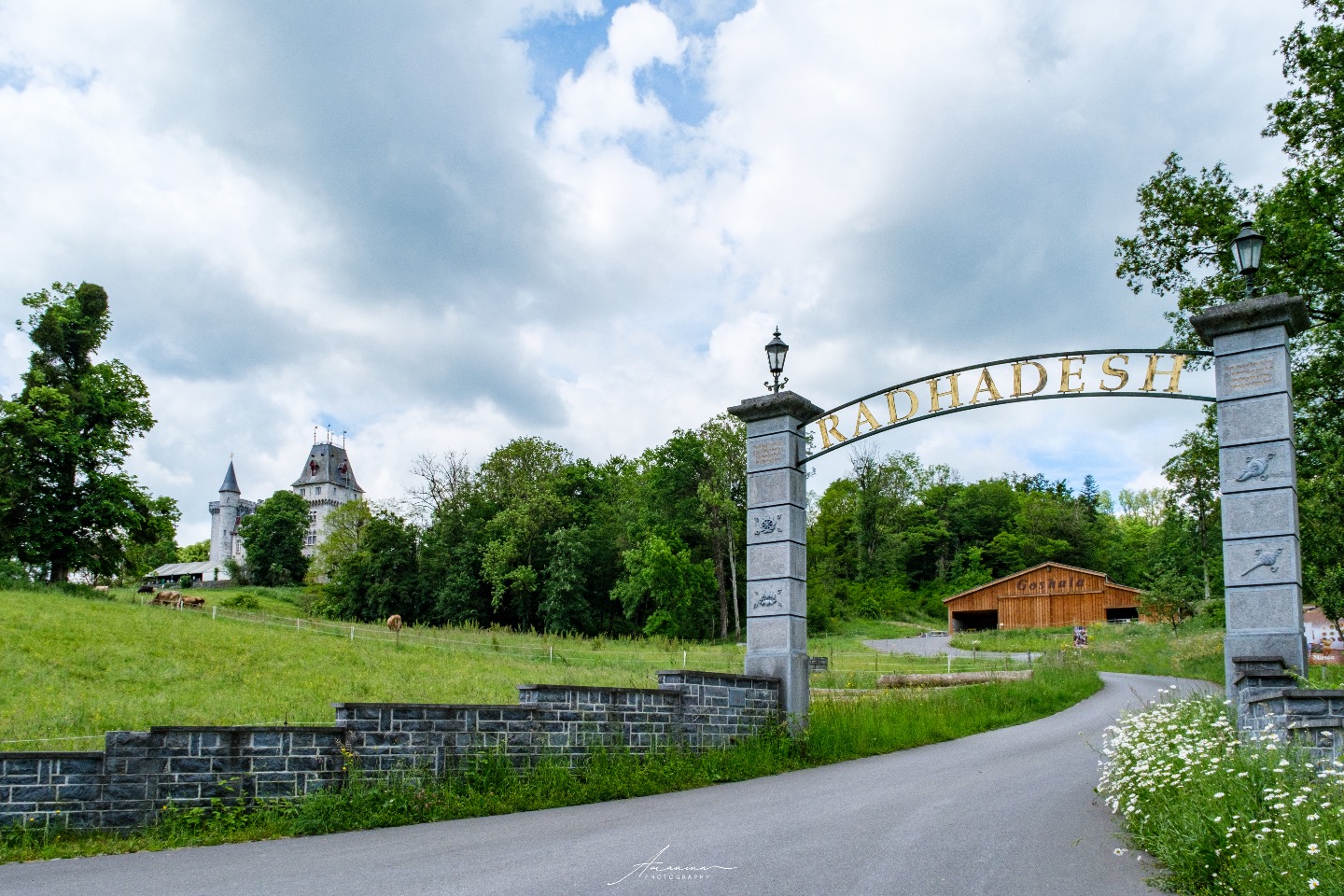
The four-day ISKCON Communications conference held at Radhadesh on May 25–28 was the thirtieth conference organized by ISKCON Communications Europe (ICE). The first day was dedicated to this anniversary.
Mahaprabhu Dasa, ICE’s current director, invited Mukunda Goswami, the original director of ISKCON Communications worldwide, to open the conference by video.
Mukunda Goswami spoke from Australia, telling sixty participants how he rescued a Los Angeles devotee abducted by her parents and deprogrammers. He filed a police report, and then talked to a Los Angeles Times reporter. When she escaped, she put herself in the custody of policemen, who reunited her with the ISKCON temple by helicopter from their police station in another city. Eventually, she sued her parents for seventeen thousand dollars. Mukunda Goswami’s first major international media success was lining up excellent news coverage of the opening of the ISKCON temple in Juhu Beach, Mumbai, in January 1978.
Then Shaunaka Rishi Dasa from Ireland and Anuttama Dasa from the USA spoke in person about Mukunda Goswami’s recruiting them into ISKCON Communications.
Shaunaka himself launched initiatives in every European country and, along with local devotees, clarified ISKCON’s identity and aims, extricating the movement from its public image as a cult. He said that being self-critical and adopting the humility endorsed by Lord Caitanya – to respect others without expecting respect – became the basis for doing their service. Shaunaka also inaugurated the ICE conferences, compiled ISKCON’s interfaith statement, and, in 1993, inaugurated the ISKCON Communications Journal (ICJ). It was published until 2005 with the financial support of Visnu Murti Dasa, who sells books in Radhadesh through Bhaktivedanta Library Services. Shaunaka gradually formed the Oxford Centre for Hindu Studies, where devotees today become leading experts in academic fields. Because he no longer had time to oversee the ICJ, it wasn’t published for sixteen years. Mahaprabhu revived the ICJ in 2021.
Anuttama served as the North American director of ISKCON Communications for five years before succeeding Mukunda Goswami as the global director in 1998. Anuttama shared some of what he has learned from other religious communications specialists, namely, that being a spokesperson for an organization entails sometimes acting as its conscience. In other words, as the outward face of a society, communications representatives need to share with the leadership the feedback they receive about how the public perceives the organization. In addition to being the GBC representative for most of the northeastern USA, Anuttama serves on the North America Regional Governing Body, the Guru Services Committee, and the ISKCON Constitution Committee. He regularly teaches communications courses worldwide, attends anti-cult conferences to monitor the pitfalls that ISKCON must avoid to be a healthy religious organization, and co-leads with his wife, Rukmini, ISKCON’s longest-running annual dialogue with Christians.
Mahaprabhu also invited Guru Gauranga Dasa (from America) to speak by video about his work fifty years ago as ISKCON Geneva’s president, preparing Srila Prabhupada’s meetings with Swiss politicians, journalists, and religionists.
A slideshow of previous ICE conferences concluded the morning session. The 2025 ISKCON Communications conference will be held at ISKCON’s center near Venice, Italy. The afternoon celebrations of the 30th anniversary of the conference included the opening of an art exhibition and onstage cultural entertainment, the special guest being Belgium’s Ambassador of India, Shri Saurabh Kumar. Photos and an article can be found here.
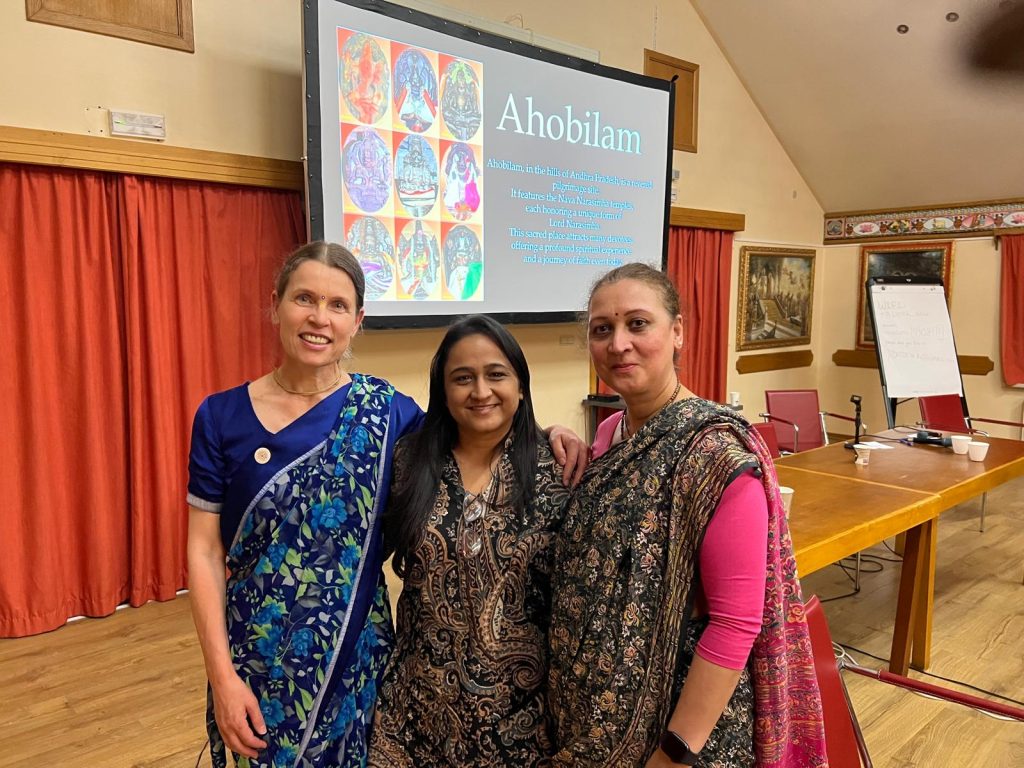
Kamala Priya Dasi (Executive Committee member of ISKCON Communications Europe and Director of Sweden Communications), Shillpa Dhawan (producer of the film Narasimha), and Sukanti Radha from ISKCON UK.
On the second day of the conference, the featured topic was “ISKCON and women.” During the first panel, on “Vaisnavis in leadership positions.” Rukmini Devi Dasi read a paper about Srila Prabhupada and his women disciples. Gopal Hari Dasa presented slides and his thoughts on Vaisnavis and brahmanism, reflecting on the Sastric Advisory Council’s paper about Brahma-gayatri-diksa. Garuda Dasa spoke on feminine intelligence and Vaisnavi leadership, and Visakha Dasi, the temple president of Bhaktivedanta Manor, offered two eight-minute videos about Vaisnavi leadership.
During the second panel, on “Vaisnavi diksa-gurus,” Kaunteya Dasa presented succinct points in a slideshow entitled “Vaisnavi Diksa-gurus? Yes, of Course!”, and Sridhara Srinivasa Dasa (from India via Zoom) offered ideas from his book Female Diksa-gurus: Do We Need Them?. Praghosa Dasa shared his thoughts on Srila Prabhupada’s ideas, presented in various slides.
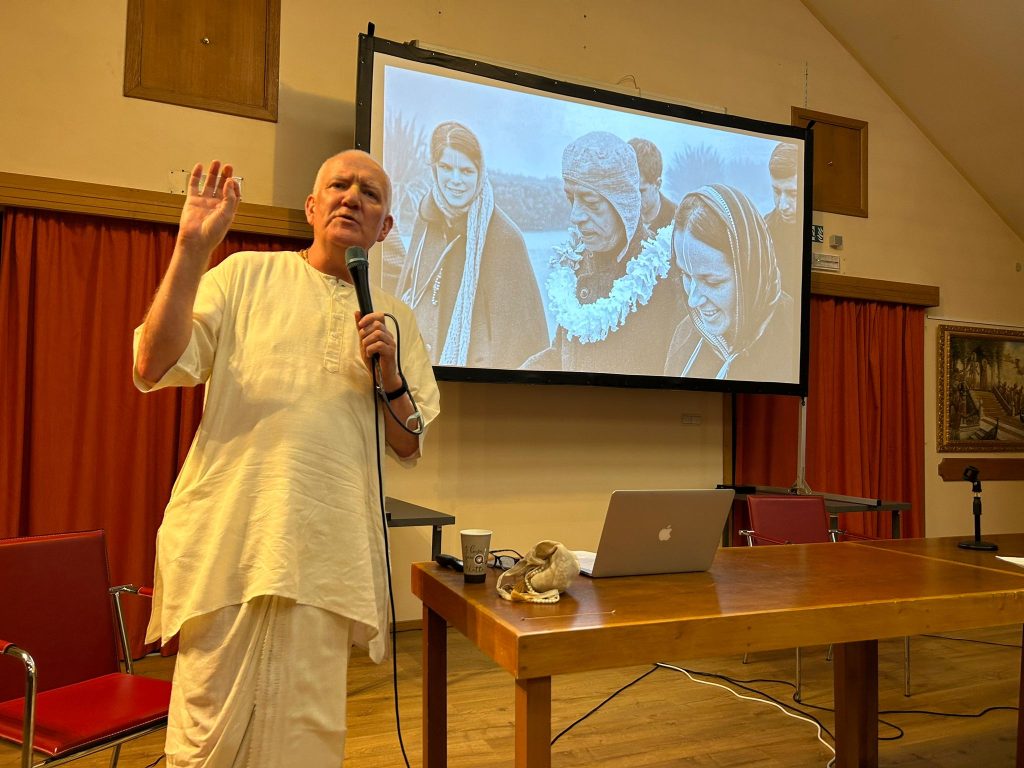
Pragosha speaking about Vaisnavi diksa-gurus.
After lunch, a lively ninety minutes of discussion kept everyone wide awake. During the rest of the afternoon, the following regional reports were given: on the UN, Bhadra Rupa Dasa; on international and North American communications, Anuttama Dasa; and on Latin American communications, Baladeva Dasa.
On the first two nights of the conference, devotees attended a private screening of a forthcoming two-hour animated film, Narsimha, made in India over the last four years by a team headed by Ashwin Kumar Baluja, who was present with his family in Radhadesh to show the work-in-progress.
On the third morning, the topic was “ISKCON and artificial intelligence (AI).” Shyam Dulal Dasa spoke on AI’s history and future and its threats and opportunities. Ananta Baladeva Dasa discussed the near-future implications of AI for ISKCON. And Gopal Hari Dasa presented a summary of an address he delivered elsewhere on AI, consciousness, and dreams. A discussion followed.
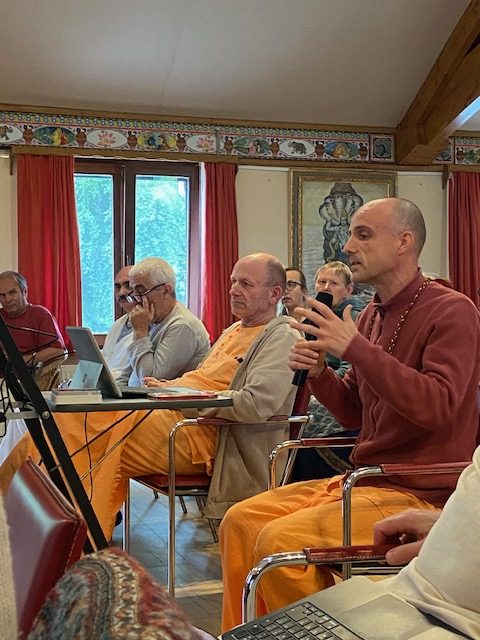
A question being asked during a discussion after a panel.
After lunch, the afternoon topic was “ISKCON and the environment.” Environmental initiatives were discussed by Anuttama Dasa, Kamala Priya Dasi, and Krishna Kshetra Swami (who joined by video).
Then reports were given on the following: the ICE Library Archives and Research Center in Italy by Shaunaka Rishi Dasa and Mahaprabhu Dasa; European communications by Mahaprabhu Dasa, Parabhakti Dasa, and Kamala Priya Dasi; communications in the UK by Radha Mohan Dasa and Krishna Sanjay Dasa; communications in Belgium by Mahabhava Dasa and Mahaprabhu Dasa; communications in France by Nitai Gaurasundara Dasa; and communications in Hungary by Gandharvika Prema Dasi.
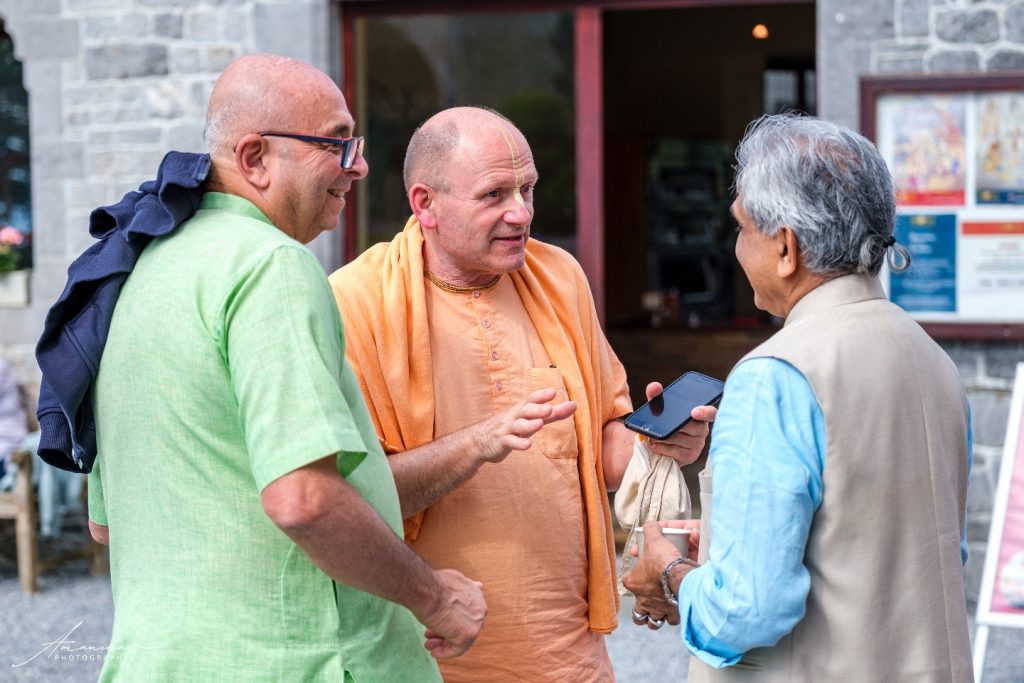
Parabhakti (Executive Committee member of ISKCON Communications Europe and President of Villa Vrindavan in Florence), Trilokatma (Director of Czech Communications and the current EURO RGB Chairman), and Krishna Sanjaya (UK Communications).
The fourth and last day featured the topic “ISKCON and politics.” Purushottama Krishna Dasa presented slides and discussed “A Transdisciplinary Approach to Peace Building: A Narrative Leading to Inclusion and Justice through the Lens of Traditional Wisdom”; Garuda Dasa presented “Dark Faith, Pure Faith: How Faith Can Move the World”; Kaunteya Dasa presented “Dealing with Politicians: A Necessary Evil”; and Gopal Hari Dasa discussed “One Nation Under…? Indian Nationalism and ISKCON.”
After a break, the following devotees discussed “ISKCON and politics” in terms of regional and historic engagements: the In God We Trust Party, Garuda Dasa; the USA, Anuttama Dasa; the UK, Akhandadi Dasa (by video) and Radha Mohan Dasa and Krishna Sanjay Dasa; and Hungary, Gandharvika Prema Dasi. After lunch, the topic was further discussed in a question-and-answer session.
The final presentation, by Vishnu Murti Dasa, was about Vanipedia. Dinner followed. Photo credit: Gert Eelen, Amanina Photography.















